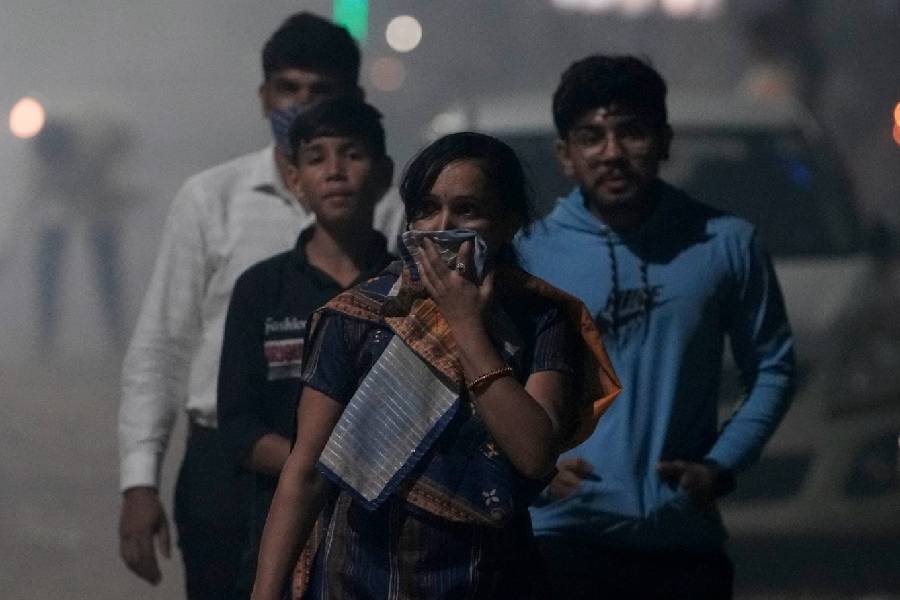The Union Health Ministry has asked Delhi and its neighbouring states to make necessary healthcare preparations to deal with any rush of patients triggered by poor air quality that may worsen in the upcoming festive season.
In a letter to the health departments of Delhi, Haryana, Punjab, Uttar Pradesh and Rajasthan this week, Director General of Health Services Atul Goel said air pollution not only accounts for acute illnesses but also precipitates exacerbation of chronic illnesses of respiratory, cardiovascular and cerebrovascular systems.
"The consequences are graver for vulnerable population such as children, pregnant women, older people, those with pre-existing illnesses, and those exposed due to their occupations such as those involved in traffic policing and municipality work, etc.," Dr Goel said and urged the state authorities for necessary healthcare preparedness.
This would require increased allocation of beds, stock updates on medicines and equipment related to case management, capacity building of health workforce, and enhanced public awareness.
In a separate advisory to all states and union territories last month, the ministry asked them to establish and expand sentinel surveillance on air pollution related illnesses, analyse statistics of such illnesses and share them at the state and central levels for timely actions.
The states have been advised to strengthen patient care services, orient doctors and staff to manage cases attributed to air pollution, and draft Health Sector Response Action Plans during high level of air pollution, particularly post-Diwali, stubble burning and winter days/months.
In this week's communication to Delhi and other northern states, Dr Goel wrote, "As you may be aware that air pollution has become a serious health challenge in recent times, it is further concerning to note that the Air Quality Index (AQI) from Delhi NCR is being reported to have reached from poor to severe levels in last few days. This may even worsen considering the upcoming festive season and onset of winter." "The state health department(s) are also requested to issue advisories to hospitals in regard to making necessary patient care preparations anticipating an increased attendance in emergencies, outdoor and indoor patient departments of medicine and pediatric specialties. This would require increased allocation of beds, and stock update on medicines and equipment related to case management," the letter read.
Dr Goel also stressed on increasing awareness among the general public about activities that could prevent further deterioration of air quality such as curbing stubble and waste burning, avoiding firecrackers during festivities, using mass public transport systems, avoiding use of personal diesel-based generators, and avoiding smoking.
It will also be advisable to avoid outdoor sports and exercise, more so for the elderly and pregnant women, and those with comorbidities, especially respiratory and cardiovascular.
Vulnerable people should seek medical help when they first develop worsening of their illness or feel discomfort and symptoms due to poor air quality, the letter stated.
In its advisory last month, the ministry said health departments and healthcare facilities have to strictly monitor daily AQI levels during such high air pollution days/months as reported from pollution control boards. Health facilities may provide daily AQI value to inform people and measures to protect, prevent and control themselves from air pollution, the advisory stated.
The advisory stressed that state health officials must take due precautionary measures during the times of high air pollution as it can influence COVID-19 infection and its outcome, although the data is as yet not conclusive.
"Particulate matter (PM) may potentially serve as a vehicle for airborne transmission of SARS COV-2 virus. Short-term and long-term exposures to PM2.5, and long-term exposures of NO2, appear to be correlated with increased susceptibility to COVID-19 infection, and higher mortality among those infected," the advisory said.
The advisory cited a recent ICMR study on the disease burden and deaths attributed to air pollution among Indians. The study showed 1.7 million deaths, or 18 per cent of the total deaths in India, in 2019 were attributable to air pollution.
The advisory stated that short-term high-level exposures can result in acute health reactions with involvement of various human organs and patients may present with certain suggestive symptoms like irritation of eyes, nose, throat and skin, cough, breathing difficulty, wheezing, chest discomfort, chest pain, headache, giddiness, limb weakness, facial deviation, etc.
Vulnerable groups can experience more severe effects such as lower respiratory tract inflammation and infection, exacerbation of asthma, bronchitis or exacerbation of chronic illnesses such as chronic obstructive pulmonary disease (respiratory system), ischaemic heart diseases, and cerebrovascular strokes.
Long-term exposures to even lower level of air pollution can result in chronic illnesses of respiratory and cardiovascular systems, lung cancer and premature deaths, it stated.
The ministry advised that schools should limit outdoor activities during days of higher pollution levels and physical activities like running, jogging, playing may be avoided or postponed. Also school activities, functions, celebrations and even birthday celebrations should be postponed.
Except for the headline, this story has not been edited by The Telegraph Online staff and has been published from a syndicated feed.











